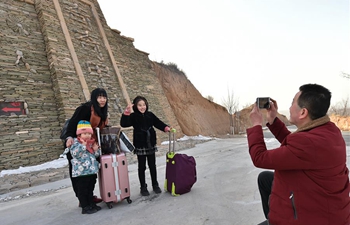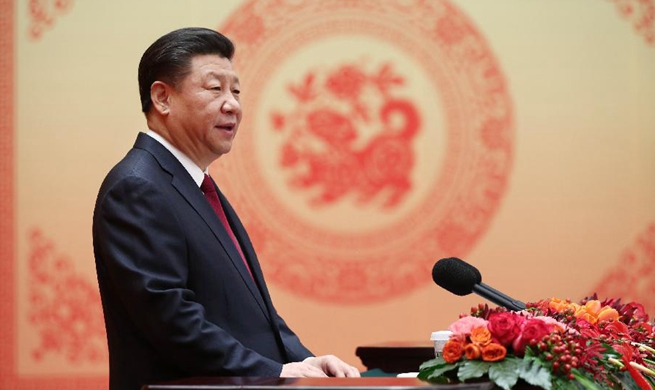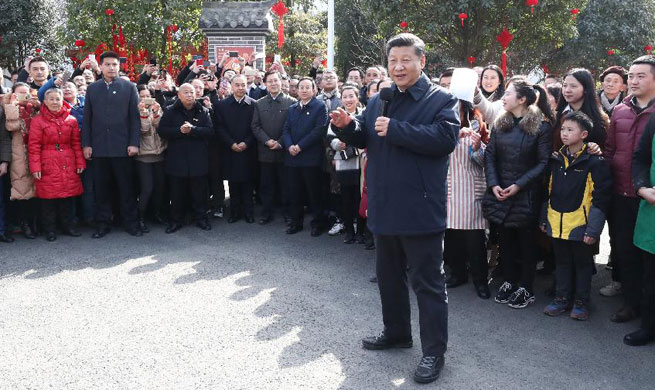by Saud Abu Ramadan
GAZA, Feb. 14 (Xinhua) -- Piles of rubbish and garbage were accumulated on the floors of the operation rooms, sections and dormitories of the Durra Children's Hospital in Gaza city due to an ongoing strike of cleaning servants who complained that they haven't received their monthly salaries for several months.
The workers of the cleaning companies, who provide round-the-clock cleaning services to 54 medical centers and 13 hospitals in the Gaza Strip, besides cooking meals for patients, have started a general strike three days ago and refrained from cleaning and cooking until they get their salaries paid by the Palestinian Authority.
Mohamed al-Hindi, spokesman of the cleaning companies in Gaza told Xinhua that the companies have been forced to resort to a comprehensive strike, "although we know that this strike will have negative effects on the health situation," adding that he holds the Palestinian consensus government responsible for the crisis.
Al-Hindi went on saying that the government hasn't paid the salaries of the cleaning companies employees for around five months, adding "the companies workers can't carry on with their jobs without getting paid."
"The companies don't accept any partial solutions until the government transfers all dues periodically without delay."
Feuds between Islamic Hamas movement and Palestinian President Mahmoud Abbas Fatah Party, which basically began in 2007, had recently casted negative shadow on more than 2 million Palestinians in the Gaza Strip and hardened their daily life, mainly in health and energy services.
Osama al-Najjar, spokesman of the Palestinian (National) Authority health ministry in the West Banks said in an earlier press statement that the PA "won't pay any single penny to the cleaning companies, which clean hospitals in the Gaza Strip, until Hamas hands over the full power to the Palestinian government."
Hamas movement had violently seized control of the impoverished coastal enclave in the summer of 2007 and routed President Abbas security forces. Although both had signed a series of reconciliation agreements and understandings in Cairo, they still differ on transfer of power of the Gaza Strip.
In October last year, Hamas and Fatah signed on a reconciliation agreement of transferring power to the Palestinian consensus government of Prime Minister Rami Hamdallah. However, the two sides disagreed on Gaza Hamas employees' salaries and the transfer of interior security in Gaza to the PA.
Power on borders crossing points was transferred to the PA security and police forces, but interior security inside the Gaza Strip remained in the hands of Hamas, while ministries of the government were handed over to PA ministers, but the employees in the ministries in the Gaza Strip are most of them Hamas supporters.
Ashraf al-Qedra, spokesman of the Hamas-run health ministry in Gaza warned on a severe humanitarian crisis due to a severe shortage of fuel and a severe shortage of electricity. He announced that 16 medical centers and three minor hospitals turned its electric generators off last week due to a fuel shortage crisis.
He also warned that delaying the salaries payment to the employees of the cleaning companies in the Gaza Strip would endanger the life of patients, especially newly born babies, adding that "500 surgeries and medical operations for patients were cancelled due to the crisis."
Majed Odwan, 75, from northern Gaza Strip town of Beit Hanoun, suffers from a kidney disease and he has been waiting for a surgery at the hospital in the town, but he was shocked when the hospital told him that he can't have his surgery because services stopped.
"I feel severe pain in my kidney and I need an urgent surgery," Odwan told Xinhua, adding that "because there is no fuel at the hospital and there is no electricity, the doctors even can't operate any machine or medical equipment in the hospital. This is really not fair, and my life is at risk."
Jamil Serhan, director of Beit Hanoun Hospital said the hospital serves 300,000 populations in northern Gaza Strip, close to the borders with Israel, adding that the hospital is specialized in nose, ear problems and in surgery for children.
He said that the hospital has 66 beds for patients admission and additional 35 beds for daily medical treatment, adding that the hospital holds 12 surgeries and treats 450 cases every day.
"We receive electricity of four hours every 12 hours and sometimes six hours every 12 hours, therefore we need to operate the generators every day from 18 to 20 hours," said Serhan, adding "the reason why we stopped providing services to the patients is because we ran out of fuel, so our savings of fuel is zero."
Om Ahmad Aashour, mother of Re'ed Ashour, a 15-year-old boy who suffers from diabetes, told Xinhua that her son was born with diabetes and he was admitted at the hospital in Beit Hanoun after his health situation deteriorated and he needs special care from the doctors and nurses.
"It's completely dark in the hospital, and when the nurse comes to give my son his injection, they turn on the lights of their mobiles," said the mother with sadness.

















